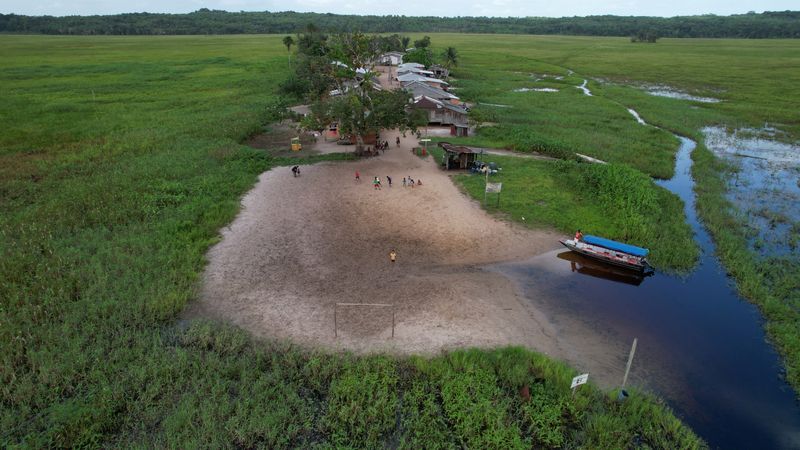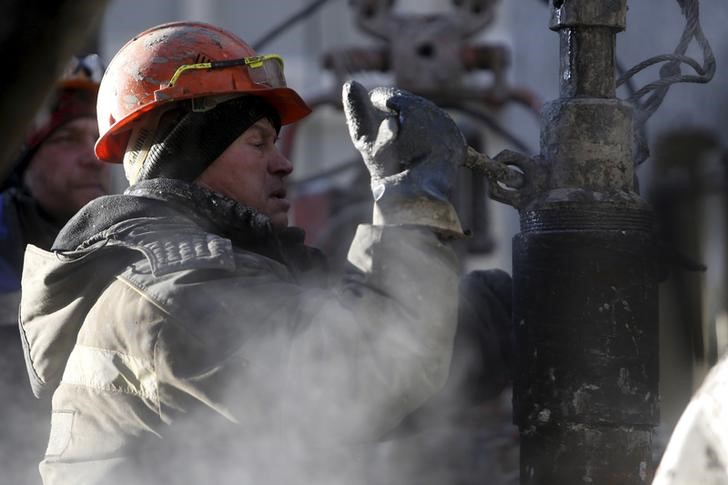By Marta Nogueira and Fabio Teixeira
OIAPOQUE, Brazil (Reuters) – State energy company Petrobras has faced growing opposition from indigenous groups and government agencies to its flagship exploration project, which would open the most promising part of Brazil’s northern coast to oil drilling.
Environmental agency Ibama last year denied Petrobras a permit for offshore exploratory drilling in the Foz do Amazonas area, citing possible impacts on indigenous groups and the sensitive coastal biome. But a call from Petrobras for Ibama to reverse its decision has received strong political support.
President Luiz Inacio Lula da Silva said in September that Brazil should be able to “explore” the region’s potential resources, given its national interest. Energy Minister Alexandre Silveira told journalists last week that it is “Brazil’s right to know the potential” of the offshore fields.
That has reinforced Petrobras’ bullish rhetoric about its chances of getting a permit to drill in the blocks off the coast of Amapa state.
“Get ready Amapa, because we are coming,” Petrobras CEO Jean Paul Prates told local politicians and oil executives last month at an event promoting offshore exploration along the north coast in an area known as the Equatorial Margin. He called it “perhaps the last frontier of the oil age for Brazil.”
He has said he expects to start drilling in the second half of this year or earlier in the most promising part of the Equatorial Margin, called the Foz do Amazonas basin, to the mouth of the Amazon River (NASDAQ:), several hundred miles away. Foz de Amazonas shares geology with the coast of nearby Guyana, where Exxon (NYSE:) is developing huge fields.
Ibama chief Rodrigo Agostinho said in November that a decision would be made in early 2024, although labor disputes at the agency have since slowed the pace of environmental permits.
Visits to four indigenous villages, interviews with more than a dozen local leaders and previously unreported documents show that organized opposition is growing against Petrobras’ attempt to reverse the freeze on exploratory drilling.
Petrobras has regained government oversight. The indigenous affairs office Funai asked Ibama regulators in December to conduct several more studies to assess the impact, according to a Dec. 11 government memo from Funai to Ibama obtained in a freedom of information request. The proposed investigations would have to be carried out before Ibama can decide whether to accept Petrobras’ appeal.
In July 2022, the Council of Chiefs of the Indigenous Peoples of Oiapoque (CCPIO), an umbrella group representing more than 60 indigenous villages in the area, asked federal prosecutors to get involved, denouncing an alleged violation of their rights stated.
Brazilian prosecutors have a mandate to protect indigenous peoples and often take their side in disputes with companies or federal and state governments. In September 2022, they advised Ibama not to issue the permit before formal consultation with local communities. Records from the prosecutors’ preliminary investigation, seen by Reuters, show that the CCPIO asked them in December 2023 to hold a 13-month formal consultation with Petrobras on indigenous views on the project.
The consultation process, along with studies proposed by Funai, would push a decision to 2025, when Brazil will host the COP30 climate change summit in the Amazon city of Belem, which could make it politically more difficult to approve drilling, they said. a person close to the CCPIO. Reuters.
Minutes of a June 2023 meeting between Petrobras, CCPIO leaders and prosecutors show that the company offered to consult local communities on possible commercial oil production in the area if Ibama requests it, but did not commit to consultations before drilling test wells .
Asked about calls from indigenous leaders for immediate consultations, Petrobras said in a statement to Reuters that the time for such requests has passed.
“The definition of whether or not it is necessary to consult indigenous peoples and/or traditional communities takes place at the initial stage of the environmental permitting process,” Petrobras said.
Ibama has not yet responded to indigenous affairs agency Funai’s recommendation late last year for more assessments of the effects of Petrobras’ exploration plans, according to an April 3 Funai document seen by Reuters.
Both agencies did not respond to requests for comment from Reuters. The CCPIO and prosecutors say consultations must take place before Ibama issues a drilling permit.
FAULT LINES The drilling standoff has created a fault line within Lula’s government, which is balancing his vows to protect the Amazon and its indigenous people with the interests of Petrobras and political allies who stand to reap the benefits of a new oil producing region.
Silveira, the energy minister, has said a single Foz de Amazonas block off the coast of Amapa state could yield more than 5.6 billion barrels of oil, which would be the company’s biggest discovery in more than a decade .
In its appeal to Ibama, the company said exploration will not negatively impact local communities.
“We confirm the understanding that there is no direct impact of the temporary activity of drilling a well 175 km from the coast on indigenous communities,” Petrobras said.
Local people and some environmentalists warn that drilling could threaten coastal mangroves and vast wetlands rich in fish and plants, while disrupting the lives of the 8,000 indigenous people in Oiapoque, on Brazil’s far northern coast .
The CCPIO, the highest indigenous authority in Oiapoque, is made up of more than 60 caciques, or chiefs, representing more than 8,000 people. They are not against the search for oil per se, but invoke what they say is the right to prior consultation by Petrobras, under the supervision of the federal prosecutor’s office and Funai.
International Labor Organization Convention 169, to which Brazil is a signatory, says governments must consult indigenous and tribal peoples through their representative institutions whenever they consider legislative or administrative measures that may directly affect them.
CHANGE ON FOOT
Drilling plans are already changing Oiapoque. Waves of migrant workers have arrived looking for jobs in an oil industry that doesn’t yet exist, state lawmaker Inacio Monteiro said.
Monteiro said he often meets with indigenous voters and talks to them about the benefits Petrobras could bring to Oiapoque, including jobs, tax revenues and social programs.
Yet the CCPIO and its allies have become increasingly vocal in their opposition as Petrobras gains support for its call, including at the COP28 climate summit in December, where Luene Karipuna told a panel that Petrobras and local politicians had tried to silence its people to lay.
“Strategically, this prior consultation is our only safety net,” said 25-year-old Karipuna, who is studying to become a teacher near her home in the village of Santa Izabel, where marshes fill with seawater at certain times of the year.
When rivers are low, the tides bring in saltwater fish that villagers eat, but some interviewed by Reuters fear this could just as easily lead to oil spills.
POLITICAL PRESSURE
Indigenous leaders said a full press of local politicians in support of Petrobras was on display at a May 2023 public hearing that Monteiro, the state lawmaker, called just days after Petrobras’ permit was denied.
Amapa’s political leaders, including key allies of Lula, gathered at Oiapoque’s town hall within days for the hearing to promote Petrobras’ plans to drill.
At the event, a man in a white polo shirt and feather headdress, Ramon Karipuna, told the crowd that indigenous people were in favor of drilling, according to minutes of the meeting seen by Reuters.
Karipuna said he was speaking on behalf of the coordinator of the CCPIO Chiefs’ Council, who was absent for “health reasons.”
Petrobras later cited Karipuna’s approval in its appeal against the denied drilling permit, describing him as a “CCPIO representative.”
However, CCPIO coordinator Cacique Edmilson Oliveira told Reuters he was not ill that day. The CCPIO had declined to participate in the hastily called event, according to a May 18 letter sent in response to Monteiro’s invitation to the hearing and seen by Reuters.
“This is very worrying. That is why we say that we already feel threatened,” Oliveira said, accusing Petrobras of distorting the views of indigenous leaders. “We never sat down and reached an agreement for approval.”
In a telephone interview, Karipuna confirmed that he worked at the city hall and that he is not a member of the CCPIO – even though Petrobras used his words as its main argument against Ibama that indigenous representatives supported drilling. He also backed away from his comments in favor of drilling.

“To this day, many people have doubts about this Petrobras company,” he said.
Asked about Karipuna’s mischaracterization, Petrobras cited the minutes of the May 2023 meeting without elaborating.


